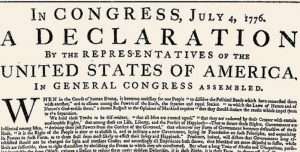The Volokh Conspiracy
Mostly law professors | Sometimes contrarian | Often libertarian | Always independent
Trump vs. the Declaration of Independence
Several of the items on the Declaration's list of grievances against King George III also apply to Donald Trump today.

Today is July 4, and we appropriately celebrate the Declaration of Independence. The Declaration is best known for its ringing affirmation of the rights to "Life, Liberty and the pursuit of Happiness." But it also contains a long list of grievances against King George III, by which the signers justified their decision to break from Britain. Sadly, many of these are relevant to Donald Trump's abuses of power today:
"He has endeavoured to prevent the population of these States; for that purpose obstructing the Laws for Naturalization of Foreigners; refusing to pass others to encourage their migrations hither, and raising the conditions of new Appropriations of Lands."
As I describe here, this wasn't just a matter of protecting the American colonies' supposed right to control immigration policy themselves. It was also about the universal human rights of would-be migrants to choose where they want to live. Many of the leaders of the American Revolution saw the new nation as a refuge for the oppressed of the world. In his famous General Orders to the Continental Army, issued on the occasion of the end of the Revolutionary War in 1783, George Washington stated that one of the reasons the United States was founded was to create "an Asylum for the poor and oppressed of all nations and religions."
Trump's policies are utterly at odds with these principles. He has launched a massive assault on nearly every type of legal migration, including trying to bar virtually all refugees (except white South African Afrikaners), closing the door to people fleeing communist oppression, deporting Iranian Christians fleeing radical Islamist persecution, stripping legal status from Afghans who fled the Taliban (including many who aided the US during the war), and more.
For cutting off our Trade with all parts of the world: For imposing Taxes on us without our Consent
Tariffs are, obviously, a type of tax. Trump is using bogus invocations of emergency powers to impose massive tariffs that exceed anything seen since the Great Depression. And he is doing so without anything approaching proper congressional authorization. His abuses in this regard are reminiscent of the monarchical abuses of King Charles I, which helped lead to the English Civil War, and greatly influenced the Founding Fathers in their efforts to curb executive authority over taxation and trade.
"For transporting us beyond Seas to be tried for pretended offences"
Trump is using the Alien Enemies Act of 1798 to "transport" hundreds of immigrants to imprisonment in El Salvador, with no due process whatsoever. In addition to illegally invoking a wartime power at a time where there is no war or other similar conflict, this is a blatant violation of constitutional due process. Moreover, the vast majority of the men deported to imprisonment have no criminal record at all, and most entered the US legally.
He has kept among us, in times of peace, Standing Armies without the Consent of our legislatures.
Modern Americans have largely lost Founding-era suspicion of standing armies, perhaps for good reason. We have had a large standing army in times of peace for many decades, and the legislature has supported it. But Trump has gone further than that, and illegally federalized the National Guard for domestic law enforcement. A trial court rightly struck it down. That decision was overruled by a misguided appellate decision, but only because of excessive deference to the executive's dubious and pretextual factual claims (the appellate court did still reject Trump's claims that he has unreviewable authority). Since then, Trump has gone a step further and illegally used the military for drug enforcement.
"He has excited domestic insurrections amongst us…"
Trump incited the January 6, 2021 attack on the Capitol, which was most definitely an "insurrection" (see also my more detailed discussion in this article). And, by the way, the Supreme Court's decision in Trump v. Anderson did not exonerate Trump on this point. The justices ruled (wrongly) that state governments cannot enforce Section 3 of the Fourteenth Amendment against would-be federal officeholders absent specific congressional legislation authorizing them to do so. They chose not to address the insurrection issue.
This part of the Declaration isn't one of my favorites. The "domestic insurrections" the Declaration complains about include British efforts to enlist black slaves against the American rebels (though it also probably was referring to recruitment of white Loyalists). It was hypocritical of the rebels to condemn the freeing of slaves to engage in "insurrection" against them even as they themselves rebelled against Britain due to lesser injustices than slavery.
That said, the insurrection Trump incited had no justification comparable to the wrongs that precipitated slave revolts or the revolution against Britain. He was inciting violence for a blatantly unjust cause.
Trump hasn't - so far - replicated all the grievances listed in the Declaration of Independence. But he has imitated enough of them to be well worthy of condemnation. The Declaration states the list of grievance against George III proves he is "unfit to be the ruler of a free people." The same is true of Trump.


Show Comments (70)